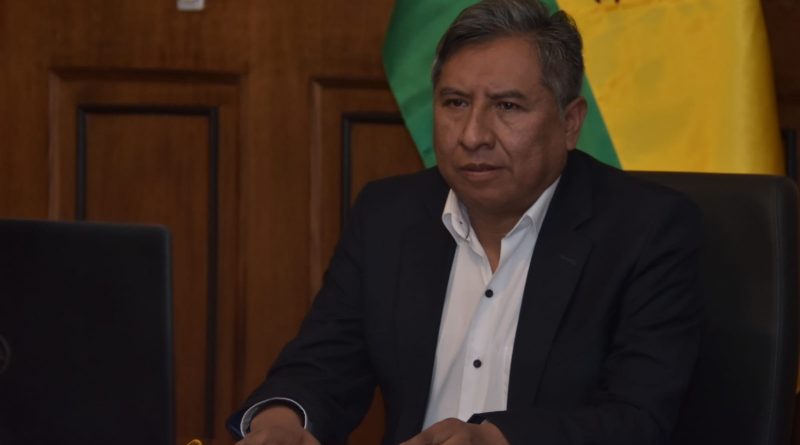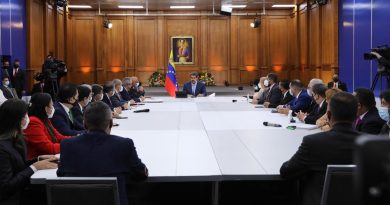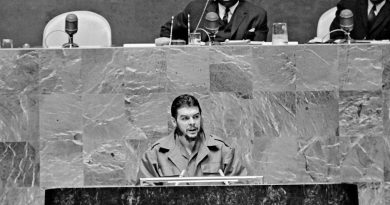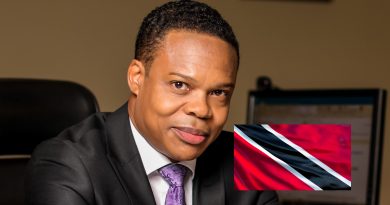Bolivia’s FM Rails Against Almagro’s Disastrous Leadership
Statement by the Minister of Foreign Affairs of the Plurinational State of Bolivia, Rogelio Mayta, at today’s extraordinary session of the Permanent Council of the Organization of American States, with the presence of Luis Almagro. Mayta rails against OAS chief Almagro for disregard the recent report by the University of Salamanca that proves there was never any electoral fraud in Bolivia and calls on member states to reflect on whether the OAS is still a relevant organization.
Minister Rogelio Mayta:
Mr. President, Distinguished permanent representatives,
As stated by the Minister of Justice of my government and our ambassador to the Organization of American States, today we bring to the attention of this forum the excesses incurred by the Secretariat for Strengthening of Democracy (SSD) of OAS General Secretariat and Mr. Luis Almagro through the communiqué issued on August 9, which “reiterates the findings of the 2019 Electoral Integrity Analysis in Bolivia.”
This communiqué was issued in response to the expert report prepared by the University of Salamanca, within the criminal proceedings begun in Bolivia in 2019 against the members of the Supreme Electoral Court for the alleged election fraud claimed by the Secretariat. This expert opinion, which deals with the computer-based aspects of the electoral computation process, has found that there was no malicious manipulation of the information in that election process; it points to shortcomings, but these don’t allow affirming objectively that a criminal action as fraud took place.
The OAS Communiqué, which was “claimed as his own” and celebrated by Mr. Luis Almagro—Secretary General of the OAS—on August 9 through his Twitter account, constitutes an aggressive act of interference in the internal jurisdiction of Bolivia—an act that attempts against its sovereignty and independence. This communiqué is furthermore in violation of Articles 1, 2, and 3 of the OAS Charter.
This action does not surprise us at all coming from Mr. Almagro, who systematically behaves as a protagonist in the internal politics of Bolivia, utters messages of hatred, racism, and disqualification, and acts protected by the immunity he enjoys for his position.
In summary, the Communiqué is presented as the only possible truth regarding the 2019 electoral process; it affirms that “the truth is one and it is objectively detailed in the Observation Report and in the OAS electoral integrity analysis.”
On this premise, it dismisses the expert opinion prepared by the Salamanca University, by affirming that: “it is untimely, it does not comply with the Agreement signed between the Government and the General Secretariat in October 2019” and “it is a serious insult to democracy in the hemisphere.”
The Communiqué is clearly an excess; neither the Secretary-General of the OAS nor its Secretariat for Strengthening Democracy, as per the rules that govern their activities, have the authority to make this type of reprimand, which is not carried out by the Permanent Council or the General Assembly.
The powers of the Secretary-General are established under Articles 107 et seq. of the Charter of the Organization and in particular under Article 112; they do not include the adoption of particular positions and the delivery of criteria regarding the internal affairs of the member states—as done in the Communiqué of August 9 and other unilateral positions expressed by Mr. Luis Almagro against Bolivia.
But the formal fact of the Communiqué is not the only excess; its content itself is disproportionate. It is thus necessary to make the following absolutely clear:
First: apart from the reservations we have concerning the reports prepared by the OAS General Secretariat on our 2019 general elections, the latter process was rendered void and new elections were held in 2020; the same party that had won the elections a year earlier stood as the winner of this new process: the MAS [Movement Toward Socialism], and with a much higher percentage of the votes.
Second: given that the Observation Reports and the 2019 electoral audit had found that electoral crimes might have been committed, the Bolivian law prescribed those criminal proceedings needed to unavoidably be commenced, that the Prosecutor’s Office had to launch inquiries in order to establish the material truth of the facts, and that the respondents had to defend themselves by presenting exonerating evidence.
And that is precisely what happened.
Third: the binding nature claimed by the Communiqué of August 9 constitutes an act of interference. The Agreement signed between Bolivia and Secretary-General Luis Almagro in 2019 for the electoral process audit of that year does not mean that the report produced thereof is to replace expert opinions or criminal judgments—let alone the work completed by Bolivian prosecutors and judges.
The binding nature claimed by the Communiqué intends to prevent Bolivian laws from being complied with, its institutionality from fulfilling its obligations, and the respondents from having the right to defense.
Fourth: The Salamanca University expert opinion that the Communiqué of August 9 makes efforts to disqualify constitutes part of a set of forensic analyses of a diverse nature that were carried out based on the so-called “findings” of the 2019 reports, with the objective of confirming whether criminal liability results for the respondents. In these criminal proceedings, an in-depth analysis was made regarding the findings claimed by Mr. Luis Almagro and the Secretariat for Strengthening Democracy (SSD) at the time. Expert technical studies were made and witnesses of the events were called to testify.
This investigation was public, as required by our laws; the parties to the proceedings and all those concerned were able to follow the proceedings and, where appropriate, present evidence or request that arrangements be made for its procurement.
Fifth: The criminal investigation carried out for more than a year—mostly during the Jeanine Añez government and with the judges and prosecutors who carried out political persecutions against the MAS—found that no crimes had been committed and that the fraud denounced was nonexistent. The Prosecutor’s Office decided to close that case because there was no evidence to go to trial; some filed objections, but that decision can be ratified or modified. The process is still under development and must continue its course, as established by our laws and on the basis of the determinations adopted by the competent authorities.
At this point, hence, the inescapable question arises: What is the reason behind the frantic attack launched by Mr. Almagro and the Secretariat for Strengthening Democracy (SSD) against the Salamanca University expert opinion and the criminal proceedings where the fraud they claimed is being debated?
This expert opinion and the Prosecutor’s examination show that the actions of Mr. Almagro and the SSD were one of the triggers for the political crisis undergone in 2019; that they are liable for precipitating the crisis, for the infringement of the constitutional order, and for the grave human rights violations recorded in that dark end of 2019; and that they acted negligently, to say the least, but with premeditation.
The Communiqué of August 9 and Mr. Luis Almagro’s statements thus constitute the anticipated plea of his defense—an unconscious confession of his guilt. The binding nature that Mr. Almagro claims seek to guarantee impunity.
Unfortunately, Mr. Luis Almagro’s actions are not surprising to us; he clearly took sides in the internal politics of Bolivia in October 2019, against the MAS; and he is now doing the same against the legitimate government of the Plurinational State of Bolivia inasmuch as the MAS took office once more after having won the 2020 elections resolutely. Mr. Almagro’s statements constitute hate speech, disqualifications without arguments, and the utterances of a political enemy—the problem being that he serves as Secretary-General of the OAS.
When Mr. Luis Almagro utters statements, it is to some extent the OAS itself that is speaking and we hence ask ourselves: Do Mr. Almagro’s words represent the thinking of the 33 OAS Member States? In the particular issue, we raised here, has this Council at least debated any of the aspects related to the expert opinion carried out? The answer is a plain No.
Thus, Mr. Almagro’s actions not only constitute an act of interference, but also a deinstitutionalization of the OAS. The General Secretariat should be an instance to bring together States, capable of creating consensus in the midst of discrepancies and differing views. In Bolivia’s view, however, this OAS, with Mr. Almagro as Secretary-General, does not live up to that purpose and it is with regret that we observe that many of the States represented here today are of the same view.
The Member States do not need a General Secretariat that does not bring together States, that divides, that anticipates judgment, adjudicates and condemns at discretion as a daily practice, and that creates power and voice beyond all rules.
Unquestionably, the OAS is not going through its best moment and every time Mr. Almagro gets away with murder through his aggressions and arbitrariness, we ask ourselves: Does it make any sense to participate in an instance in which nothing is built and we are attacked instead? Does it make any sense to keep this forum as it stands presently? Does a forum for American integration in which not all the countries of our hemisphere are participants make any sense?
With hope, we underscore that a critical thinking process on the OAS is underway in our region; the countries that constitute this region, their universities, institutions, and peoples are debating whether the OAS makes any sense as it stands presently. Does it serve our people? The debate is open.
Bolivia takes part in this thought process. We believe that we need more integration and that we must continue to bet on multilateralism, under the principles of non-intervention in internal affairs, respect for international law, the sovereignty of the states, and self-determination of the peoples.
Bolivia is currently on the difficult path of de-escalation of opposing positions, overcoming the racist narrative that sought to legitimize the overwhelming violence of late 2019. Communiqués as that of August 9 and each of the unilateral positions uttered by Mr. Luis Almagro against Bolivia threaten this objective.
We will keep moving forward, regardless.
We are aware that, in order to overcome these tough times, as a society, we must know the truth of what happened. It is our right as a people. We cannot simply wipe the slate clean, as if nothing had happened. The constitutional order was broken, human rights were violated, and a polarization based on a racist narrative was spawned in our society. All necessary legal proceedings must be followed.
From this presentation, it is clear that the Communiqué of August 9 and Mr. Luis Almagro’s positions constitute acts of interference in internal affairs, which we do not accept and herewith denounce.
Bolivia has been victim of the attacks described herein. If charges based on the codes of institutionality are not brought against Mr. Luis Almagro’s actions, any of the other states could be the victim tomorrow.
From this experience, we call on all the countries of the hemisphere to reflect on the organization that we want, or that we do not want, and to act to build it.
Thank you



